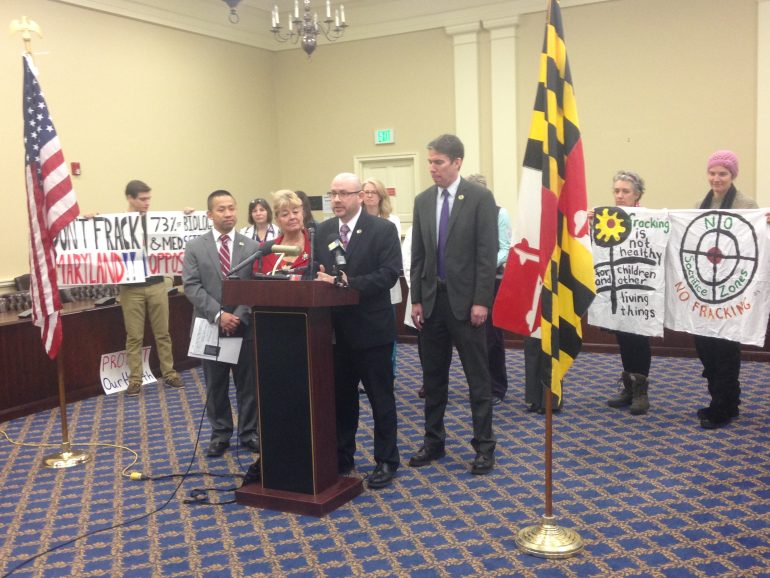ANNAPOLIS–Environmentally stringent and costly drilling regulations are not enough to protect the public’s health from hydraulic fracturing’s pollutants, according to a coalition of legislators, environmental groups and health professionals who rallied Thursday in support of a moratorium bill.
Delegate David Fraser-Hidalgo, D-Montgomery, is sponsoring the Protect Our Health and Communities Bill that would delay hydraulic fracturing, or fracking, in Western Maryland for the next eight years in order to provide more time to investigate health and environmental ramifications.
At the end of his term, former Gov. Martin O’Malley established costly permit regulations to drill for natural gas in Maryland that reflected a December analysis by the state’s environment and natural resources departments, said David Venko, chair of a commission charged with studying safe drilling in the state.

Proponents of the bill said the pending regulations, which would allow for fracturing in the state of Maryland with multiple permits and associated fees, do not go far enough to ensure protection of public health and the environment.
Maryland Gov. Larry Hogan is against the moratorium bill, said spokeswoman Erin Montgomery, because the state is “sitting on a wealth of clean natural gas in Western Maryland.”
“Fracking has been studied for over three years now, and we don’t need another eight years of studies before making a decision,” said Montgomery. “If it can be done in an environmentally safe way then we should move forward with it.”
But bill proponents point to studies that indicate the costs to the environment and public health outweigh the economic benefits.
What is hydraulic fracturing, or “fracking?”
Imagine a well that, instead of pulling water out, forces water into the ground to draw up oil and natural gas.
This high-pressure injection of water, sand and chemicals into the bedrock breaks it up, according to the U.S. Geological Survey.
As the rock breaks, it releases natural gas and/or oil that travels back up the well.
The U.S. Geological Survey estimated that the Marcellus Shale — the underground natural gas reservoir in the Appalachian Basin — contains a mean of about 84.2 trillion cubic feet of gas and an average of almost 3.4 billion barrels of total natural gas liquids.
Hydraulic fracturing of oil and natural gas, known as “traditional hydraulic fracturing,” has occurred in the U.S. since the late 1940s, but no permits have been issued to date in Maryland for gas exploration or production from the Marcellus Shale, according to the Maryland Department of the Environment.
“I ran a small business for 11 years so I get the whole economic argument, but I believe that when you take the totality of all the costs involved it’s not a good practice for Maryland,” Fraser-Hidalgo said.
The likelihood of unhealthy effects of fracking on air quality, the health care system and noise, among other environmental and health-related factors studied, is “high” or “moderately “high”, according to the University of Maryland’s Institute for Applied Environmental Health.
As of Wednesday, a coalition of 100 environmental groups, businesses, health centers, faith agencies and advocacy groups is backing Fraser-Hidalgo’s bill.

Members of the coalition want to evaluate the impacts of shale development in other states where it is already under way before allowing it in Maryland, said Dr. Gina Angiola, a member of the board of directors of Chesapeake Bay Physicians for Social Responsibility.
“I’m very concerned because I don’t believe that regulations — there’s no evidence that regulations or regulatory approach can adequately protect public health,” Angiola said.
But Delegate Wendell Beitzel, R-Garrett and Allegany, said that whether through the moratorium or the strict regulations O’Malley established, fracking will essentially be banned in Western Maryland.
The pending rules “were drafted with the thought in mind that the regulations themselves would be so restrictive that a gas company would not come to Maryland to operate,” Beitzel said.
If the pending regulations are put into place on Feb. 23, the expected start date, only 15 percent of Garrett County would be available for drilling, he said, and the expenses and number of permits required to drill would turn most companies away.
“I think we’re being deprived, especially landowners, of their ability to utilize their property — to utilize the resources on their property — for whatever purposes they desire,” said Beitzel, who said he believes hydraulic fracturing would provide economic stimulation to Garrett County if properly regulated.


You must be logged in to post a comment.